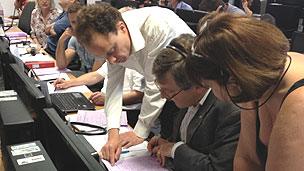Russell Group universities have student places
- Published

Clearing is still open
A quarter of universities in the UK's Russell Group still have vacancies, as the new tuition fees regime comes in.
The group, which includes many top universities, says changes to the funding system in England have meant students who wanted to go to a good university and had the right grades have not been able to.
Six out of its 24 members have spaces.
Higher Education Minister David Willetts says it is likely fewer people will go to university this year.
There is more of a market this year in student places and some Russell Group universities have never previously offered places through Clearing - the system which matches students to vacancies.
Universities in England have been able to expand by taking as many students with top grades (AAB or higher) as they can accommodate or if they are charging fees of less than £7,500, but their "core" number of places have been cut.
And fewer students than expected got the top grades.
Tuition fees rise to a maximum of £9,000 a year for many students around the UK this autumn, following the decision to raise fees in England's universities.
According to the Ucas Clearing website there are vacancies for courses beginning in the next two weeks at at least six out of the Russell Group's 24 universities, including Birmingham, Sheffield and Queen Mary's, University of London.
Dr Wendy Piatt, director general of the Russell Group, said: "If universities couldn't recruit enough high-calibre students they risked losing funding but if they recruited too many students with grades ABB or below they risked substantial fines.
"The difficult choices faced by admissions departments this year means students who wanted to attend a leading university and had the right qualifications have not been able to, even though those universities wanted to accept them."
'Significant changes'
At a conference yesterday, Mr Willetts acknowledged it was likely that fewer people would go to university this year, although it would still be a high figure.
The numbers getting AAB grades or equivalent were lower than expected he said - 80,000 rather than 85,000.
He said: "It looks as if there may have been fewer pupils achieving predicted AAB grades at A-level, but rather more getting top grades in equivalent high-class vocational qualifications, such as BTecs.
"Different institutions will have been affected differently; that is inevitable when making significant changes, which are intended to take greater account of student choice.
"I recognise this comes at a time when there have been other pressures too. The number of 18-year-olds is falling.
"Demand is unusually depressed this year because more students went straight to university last year, missing out a gap year. And more may be delaying until next year when ABB kicks in."
According to Ucas, there are more than 26,000 university courses with empty places, compared with 20,000 at this time last year.
- Published21 August 2012
- Published17 August 2012
- Published16 August 2012
- Published17 August 2012
- Published15 August 2012
- Published10 August 2012